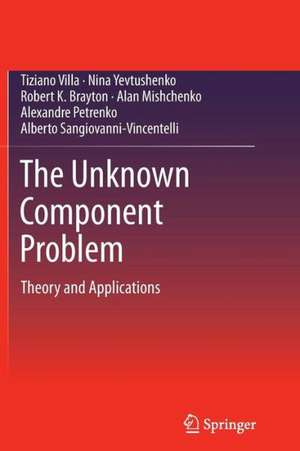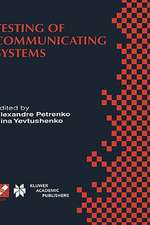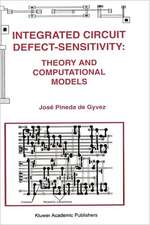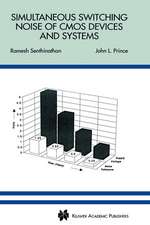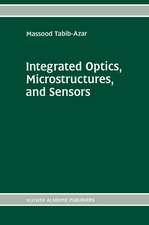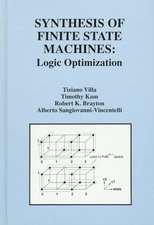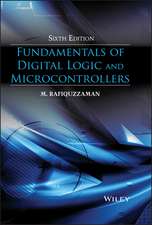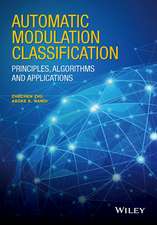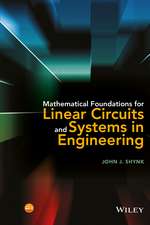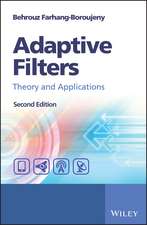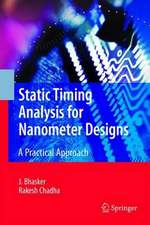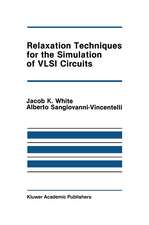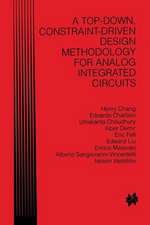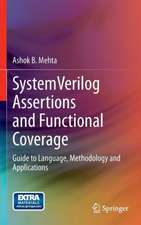The Unknown Component Problem: Theory and Applications
Autor Tiziano Villa, Nina Yevtushenko, Robert K. Brayton, Alan Mishchenko, Alexandre Petrenko, Alberto Sangiovanni-Vincentellien Limba Engleză Paperback – 25 ian 2014
The book is a blend of theory and practice, which includes a description of a software package with applications to sequential synthesis of finite state machines. Specific topologies interconnecting the components, exact and heuristic techniques, and optimization scenarios are studied. Finally the scope is enlarged to domains like testing, supervisory control, game theory and synthesis for special omega languages. The authors present original results of the authors along with an overview of existing ones.
| Toate formatele și edițiile | Preț | Express |
|---|---|---|
| Paperback (1) | 945.92 lei 6-8 săpt. | |
| Springer Us – 25 ian 2014 | 945.92 lei 6-8 săpt. | |
| Hardback (1) | 952.09 lei 6-8 săpt. | |
| Springer Us – 15 noi 2011 | 952.09 lei 6-8 săpt. |
Preț: 945.92 lei
Preț vechi: 1153.57 lei
-18% Nou
Puncte Express: 1419
Preț estimativ în valută:
181.02€ • 196.56$ • 152.06£
181.02€ • 196.56$ • 152.06£
Carte tipărită la comandă
Livrare economică 22 aprilie-06 mai
Preluare comenzi: 021 569.72.76
Specificații
ISBN-13: 9781489973948
ISBN-10: 148997394X
Pagini: 328
Ilustrații: XVI, 312 p.
Dimensiuni: 155 x 235 x 17 mm
Greutate: 0.46 kg
Ediția:2012
Editura: Springer Us
Colecția Springer
Locul publicării:New York, NY, United States
ISBN-10: 148997394X
Pagini: 328
Ilustrații: XVI, 312 p.
Dimensiuni: 155 x 235 x 17 mm
Greutate: 0.46 kg
Ediția:2012
Editura: Springer Us
Colecția Springer
Locul publicării:New York, NY, United States
Public țintă
ResearchCuprins
1. Synopsis.- 2. Equations over Languages and Finate Automata.- 3. Equations over Finite State Machines.- 4. Equations Over w-Automata.- 5. A Survey of Relevant Literature.- 6. Implementation of Automata Manipulations.- 7. Manipulations of FSMs Represented as Sequential Circuits.- 8. The Software Package BALM.- 9. Fundamental Operations in BALM.- 10. Computation of Flexibility in Sequential Networks.- 11. Computation of Sequential Flexibility in Netlists by Windowing.- 12. Computation of Sequential Flexibility in Networks of FSMs by Windowing.- 13. Language Solving Using Simulation Relations.- 14. Exploitation of Flexibility in Sequential Networks.- 15. Supervisory Control.- 16. Testing.- 17. Synthesis of Strategies for Games.- 18. Extending BALM to Synchronous Equations Over co-Büchi Specifications.- 19. Conclusions and Open Problems.
Recenzii
From the reviews:
“Synthesis is a hard computational area that is now becoming accessible, thanks to increasing computational power. It is good to have a book from experts that surveys the techniques available.” (K. Lodaya, ACM Computing Reviews, November, 2012)
“Synthesis is a hard computational area that is now becoming accessible, thanks to increasing computational power. It is good to have a book from experts that surveys the techniques available.” (K. Lodaya, ACM Computing Reviews, November, 2012)
Textul de pe ultima copertă
The Problem of the Unknown Component: Theory and Applications addresses the issue of designing a component that, combined with a known part of a system, conforms to an overall specification. The authors tackle this problem by solving abstract equations over a language. The most general solutions are studied when both synchronous and parallel composition operators are used. The abstract equations are specialized to languages associated with important classes of automata used for modeling systems.
The book is a blend of theory and practice, which includes a description of a software package with applications to sequential synthesis of finite state machines. Specific topologies interconnecting the components, exact and heuristic techniques, and optimization scenarios are studied. Finally the scope is enlarged to domains like testing, supervisory control, game theory and synthesis for special omega languages. The authors present original results of the authors along with an overview of existing ones.
The book is a blend of theory and practice, which includes a description of a software package with applications to sequential synthesis of finite state machines. Specific topologies interconnecting the components, exact and heuristic techniques, and optimization scenarios are studied. Finally the scope is enlarged to domains like testing, supervisory control, game theory and synthesis for special omega languages. The authors present original results of the authors along with an overview of existing ones.
Caracteristici
Provides a complete account by a unified mathematical model of a synthesis problem that appears in different areas of computer science and design of electronic systems Presents different types of mathematical models that can be used to specify the components of a system Casts the problem of computing the unknown component in the common frame of solving equations over languages and automata Includes supplementary material: sn.pub/extras
